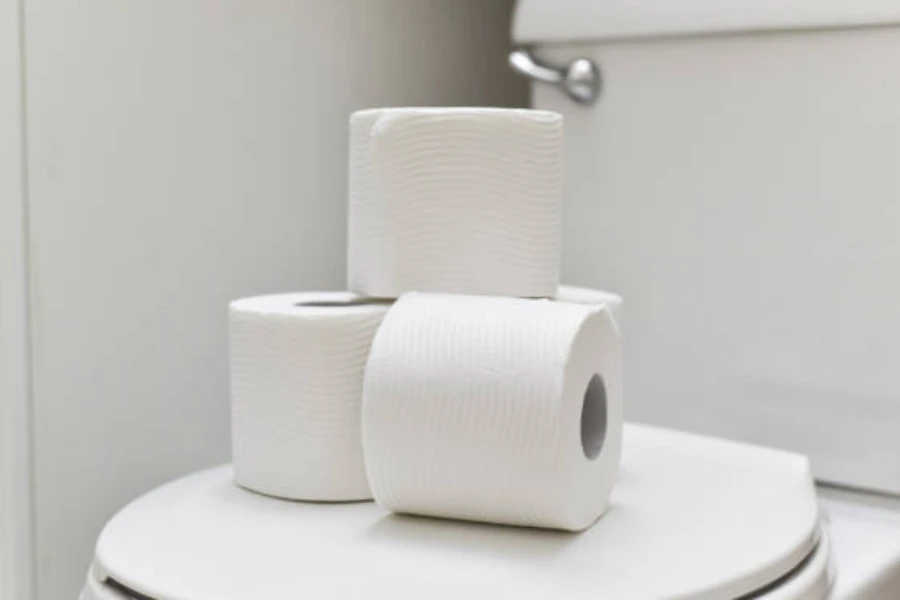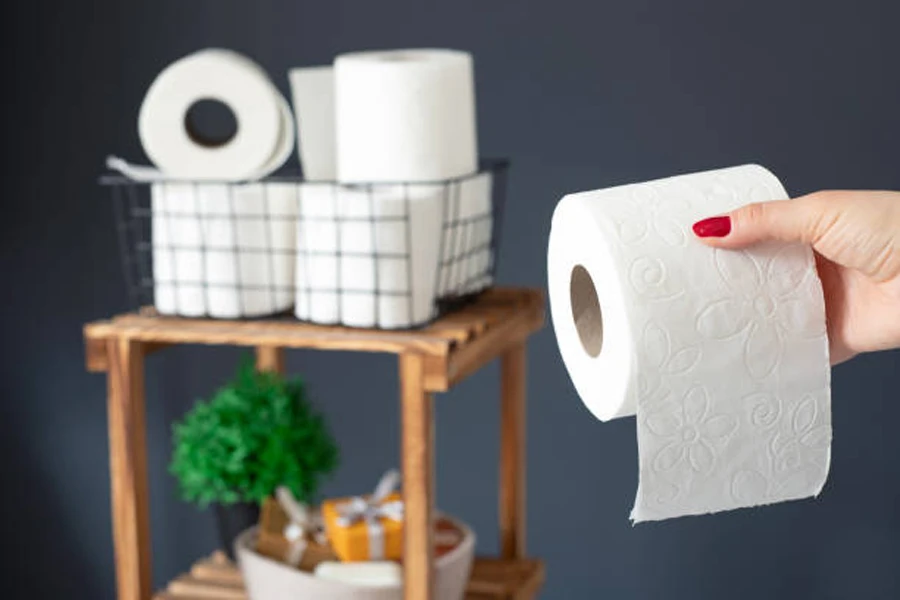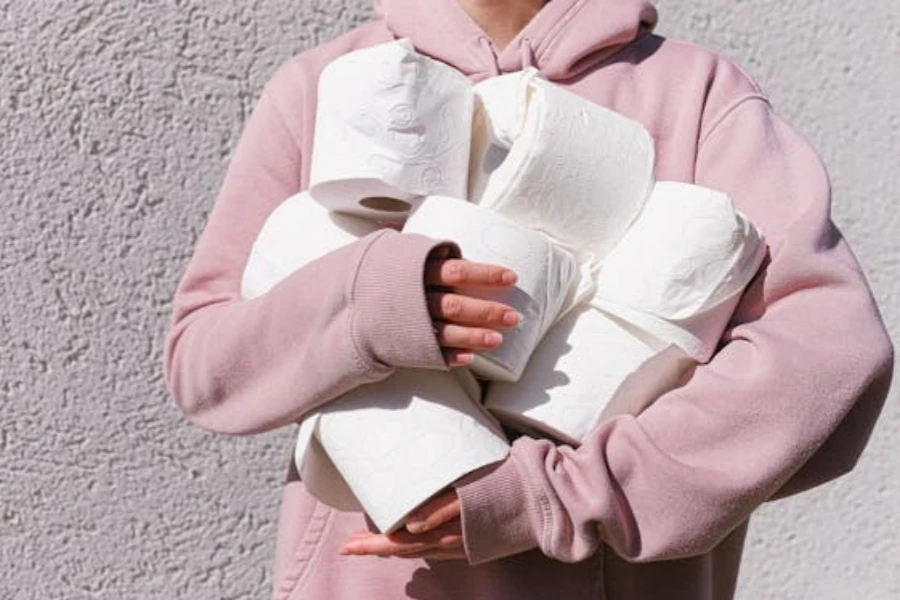Table of Contents
● Introduction
● Main types of toilet paper and their uses
● Current market trends in toilet paper for sensitive skin
● Key considerations for selecting toilet paper for sensitive skin
● Leading models and features to look for in 2025
● Conclusion
Introduction
When choosing toilet paper for sensitive skin, you must consider comfort and safety. A suitable option should provide a gentle experience while avoiding chemicals that could irritate. As people become more conscious of the importance of skincare, businesses are shifting towards using eco-materials and sustainable production methods in their products. Given the rising demand, selecting skin-friendly and eco-conscious toilet paper is gaining significance. These items are not just advantageous for individuals; they also match the health and eco movements.
Main types of toilet paper and their uses

Traditional toilet paper
Regular toilet paper is a budget-friendly choice known for its soft and sleek surface texture. It’s usually crafted from wood pulp or a mix of reused materials, making it a common and handy option for various needs. Although it’s cozy for many people, it might sometimes irritate the skin due to certain chemicals used in its manufacturing process, like chlorine bleach or artificial scents. Even though these additives are typically present in small amounts, they could lead to reactions in people with extra sensitive skin.
Bamboo-based toilet paper
Many people choose bamboo toilet paper because it is gentle on the skin and good for the environment, too! Unlike toilet paper, containing chemicals like chlorine and fragrances that may irritate the skin of those with sensitivities or allergies, bamboo is made from a sustainable resource that is naturally softer and hypoallergenic. Its antibacterial properties make it more appealing for those looking for an eco-friendly option for their delicate skin needs.
Recycled toilet paper
Recycled toilet paper offers an option made from recycled materials used by consumers previously, like packaging and office paper waste, instead of new trees for virgin pulp paper production processes, as it helps preserve forests and reduce waste generation for a more sustainable way of living. This type of eco toilet paper is especially gentle on the skin since it typically avoids the harsh chemicals commonly found in the bleaching process of traditional virgin pulp toilet paper manufacturing methods, which can cause irritation or allergies for some individuals with delicate skin. Advancements in production technologies have resulted in recycled paper being softer than before. It has become popular for those looking for a sustainable yet gentle alternative to conventional options available today. Nevertheless, a few reused papers might still hold onto some remaining inks or chemicals; hence, selecting brands that prioritize processing and chemical-free manufacturing for skin safety is crucial.
Current market trends in toilet paper for sensitive skin

Growth in Demand for Eco-Friendly Options
The demand for toilet paper has seen a notable increase in markets where sustainability is becoming a key concern for consumers. Market Research Future predicts that the worldwide toilet paper is expected to hit a value of USD 21.46 billion by 2028, with a growth rate of 4.2% from 2023. Consumers who prioritize eco-friendliness are increasingly choosing toilet paper crafted from materials like recycled paper or bamboo, resulting in a surge in the popularity of these products. The increasing focus on environmental concerns encourages businesses to embrace eco-friendly practices by shifting towards providing chemical-free, biodegradable, and chlorine-free products.
Technological Advancements in Toilet Paper Production
Technology advances have completely transformed the way toilet paper is made today. They specifically focus on its softness and how gentle it is for users with skin concerns like allergies and irritations. Modern production methods now enable the use of materials like refined pulp and gentle additives that greatly improve the overall comfort for users. Additionally, efforts towards making toilet paper hypoallergenic are geared towards lessening skin irritations by reducing fragrances, dyes, and other chemical substances used in manufacturing. Businesses are dedicating resources to developing technologies that guarantee their goods are safe for the skin and deliver the softness and coziness that customers anticipate. This shift towards top-notch manufacturing reflects an effort to produce superior skin-friendly items without sacrificing environmental or practical advantages.
Key considerations for selecting toilet paper for sensitive skin

Material composition
The material used is crucial for sensitive skin types when choosing toilet paper. Hypoallergenic options like bamboo cotton and unbleached paper are often suggested for their qualities. They are less likely to irritate than traditional toilet paper made from wood pulp. Chemicals like chlorine bleach and other harsh substances commonly found in paper manufacturing can lead to reactions, especially for people with sensitive skin. Additionally, artificial fragrances and additives used for texture or scent enhancement can worsen the irritation. Companies that prioritize materials like unbleached paper or bamboo usually steer clear of these toxic substances to provide a safer choice for people with sensitivities.
Softness and strength
Finding the balance between softness and strength is key when selecting toilet paper. Softness is important for comfort, mostly for those with sensitive skin, and strength guarantees the paper can do its job well without falling apart easily. Wet strength tests assess how well the paper holds up when wet without losing its structure integrity. Achieving a soft texture can involve methods such as using natural fibers or specific processing techniques; meanwhile, ensuring durability can be attained by carefully selecting robust yet gentle fibers.
Environmental impact

The environmental effects of toilet paper have become a concern for many shoppers. More people are opting for compostable toilet paper as they look for better choices in their everyday lives. Compared to traditional toilet paper, which uses chlorine bleaching and plastic packaging with a greater environmental footprint, eco-friendly things are gaining traction. Take bamboo-based products, they’re a great choice due to the rapid growth of bamboo and the reduced need for chemicals during production. Traditional versus modern choices’ impact on resource consumption and waste generation shows a significant contrast in their ecological footprint.
Leading models and features to look for in 2025

Top Bamboo-Based Products
When businesses look for items to use in their operations or offer to customers and clients alike, it’s crucial to consider the quality of the bamboo product fibers since how they’re processed can influence both their softness and eco-friendliness. As an example, opting for products made from bamboo fibers that are grown organically can offer protection for the skin while also contributing to the efforts against deforestation. These items are soothing to the skin and enable brands to align with their sustainability objectives.
Best Eco-Friendly and Organic Options
In 2025, organic and eco-friendly toilet paper is a rising popular trend, mainly those carrying official certifications such as USDA Organic or Forest Stewardship Council (FSC). These certifications guarantee that the products are manufactured with fewer chemical additives, offering an alternative for individuals with sensitive skin. For businesses, choosing certified items is a simple strategy to adhere to environmental regulations and attract the expanding population of environmentally conscious shoppers.
Premium Softness and Hypoallergenic Certifications
Top certified brands commonly use materials like organic bamboo or recycled paper treated with fewer chemicals. These items assure softness and absorbency while also providing reassurance by reducing the chances of irritation. As consumer tastes change, the demand for products tested by dermatologists will probably continue to be a focus, making it an important sector for companies to invest their money in.
Conclusion
When selecting toilet paper for sensitive skin needs, softness and strength are essential factors to consider. In addition, opt for eco-friendly materials like bamboo, which are gentle and free from harsh chemicals and scents. Combining these factors and production leads to a product that safeguards the skin and supports sustainability initiatives, making it a top pick for companies focusing on customer well-being and eco-friendliness.




